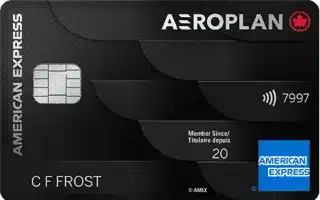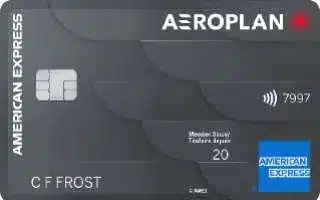Compare Credit Cards
Let me fetch more of the page to see all the cards in the comparison table:Let me try fetching the page again with a different approach:I can see one card featured prominently (American Express Aeroplan Reserve Card), but I’m not getting the full comparison table. Let me search for more information about Aeroplan credit cards available in Canada to ensure I create comprehensive content:Based on the information from the page and my research, I can see the featured card is the American Express Aeroplan Reserve Card. Let me create comprehensive SEO content about the best Aeroplan credit cards that aligns with this focus while covering the broader landscape of Aeroplan cards available to Canadians.
Best Aeroplan Credit Cards in Canada
So you want to rack up Aeroplan points. Smart move. Air Canada’s loyalty program can get you free flights, lounge access, and enough perks to make economy feel less like a cattle car. But picking the wrong Aeroplan credit card? That’s like buying a Ferrari to drive in downtown Toronto traffic. Waste of potential.
Let’s talk about what actually matters when choosing an Aeroplan credit card in Canada. Not the shiny welcome bonuses everyone obsesses over. The real stuff. Like how much you actually fly, whether you can stomach a $599 annual fee, and if you’re disciplined enough to pay off your balance every month.
The Premium Play: American Express Aeroplan Reserve Card
We’re talking about the heavyweight champion of Aeroplan cards here. The American Express Aeroplan Reserve Card isn’t messing around with its 130,000-point welcome bonus and $599 annual fee that makes most people’s eyes water.
But here’s what the sticker shock crowd misses. This card basically prints money if you fly Air Canada more than twice a year. Free checked bags for you and eight friends? That’s $35-50 per person, per flight. Maple Leaf Lounge access? Try buying that separately and watch your credit card cry. Priority everything at the airport? Priceless when you’re running late.
The earning structure actually makes sense too. You get 3x points on Air Canada purchases, 2x on dining and food delivery, and 1.25x on everything else. Translation: every boring expense becomes future vacation fuel. That quarterly tax payment to the CRA? Congrats, you just earned enough points for a short-haul flight.
Who shouldn’t get this card? Anyone who flies WestJet exclusively. People allergic to annual fees. If you carry a balance month to month, fix that disaster before even thinking about premium rewards cards. This isn’t charity. It’s math.
TD’s Aeroplan Army
TD went all-in on Aeroplan, and they’ve got cards for every budget. Starting with the TD Aeroplan Visa Infinite, which is basically the Reserve Card’s less flashy cousin who still gets invited to all the good parties.
The Infinite gives you 1.5x points on gas, groceries, and Air Canada purchases. Notice something? These are categories where you actually spend money. Not “luxury yacht rentals” or whatever nonsense some cards bonus. Real spending, real rewards. The annual fee’s $139, but they often waive it for the first year because TD knows once you start earning points, you’re hooked.
Then there’s the TD Aeroplan Visa Infinite Privilege if you’re fancy. Higher fee, more perks, unlimited Maple Leaf Lounge access. It’s for people who’ve graduated from asking “is business class worth it?” to “which business class seat has the best wine selection?”
The TD Aeroplan Visa Platinum? It’s fine. No annual fee, lower earn rates. Perfect for your kid in university who needs to build credit while occasionally flying home for Thanksgiving.
CIBC Joins the Party
CIBC wants in on the Aeroplan action too. Their Aeroplan Visa Infinite Privilege Card throws around 85,000-point welcome bonuses like confetti at a wedding.
What makes CIBC different? They’re desperately trying to steal market share from TD and Amex, so their offers tend to be aggressive. More bonus points, better promotional rates, occasional transfer bonuses that make no financial sense for them but work great for you.
The regular CIBC Aeroplan Visa Infinite is solid. Not spectacular, just solid. Like that reliable friend who always shows up on time but never has interesting stories. It earns points, gives you some Air Canada perks, and doesn’t charge you a fortune. Sometimes boring is exactly what you need.
The Cobalt Card Hack
Here’s something the banks don’t want you to know. The American Express Cobalt Card might be the best Aeroplan credit card, and it’s not even an Aeroplan credit card.
Stick with me here. The Cobalt earns 5x Membership Rewards points on groceries and dining. Those transfer to Aeroplan at 1:1. So you’re effectively earning 5 Aeroplan points per dollar at Loblaws. Show me another card doing that. I’ll wait.
The monthly fee structure ($12.99) actually works in your favor if you’re strategic. The welcome bonus spreads over 12 months, forcing you to use the card consistently instead of sock-drawering it after hitting the minimum spend. Behavioral economics at its finest.
Business Cards Nobody Talks About
Got a business? Even a side hustle selling crafts on Etsy? Business Aeroplan cards could transform your rewards game.
The American Express Aeroplan Business Reserve Card is basically the personal Reserve on steroids. Same perks, but you can run legitimate business expenses through it. That $10,000 equipment purchase? Points. Monthly software subscriptions? Points. Client dinners you’re writing off anyway? Double dipping with points and tax deductions.
TD and CIBC have business versions too. They’re fine. Not amazing, just fine. The earn rates are similar to personal cards, but the credit limits tend to be higher, and you can get employee cards to multiply your earning potential.
The No-Fee Options
“I refuse to pay annual fees” is something I hear constantly. Cool. You’re leaving money on the table, but at least you’re principled about it.
The TD Aeroplan Visa Platinum and CIBC Aeroplan Visa Card both charge zero annual fees. You earn fewer points, get fewer perks, and generally have a worse time at airports. But hey, no annual fee!
Here’s the reality check. If you spend $20,000 annually on credit cards, the difference between a no-fee card earning 1 point per dollar and a premium card earning 1.5-2 points per dollar is 10,000-20,000 extra points. That’s worth $200-500 depending on redemptions. Minus a $139 annual fee, you’re still ahead.
But if you barely use credit cards, hate tracking spending, or just want something simple? No-fee cards work. Not optimal, but functional.
Acceptance Issues in Canada
Time for the awkward conversation. Not everyone in Canada takes American Express. Your local pizza joint? Probably not. Government services? Definitely not. Costco? They broke up with Amex years ago and they’re not getting back together.
This means you need a backup plan. Get your Amex Aeroplan Reserve for maximum earnings where it’s accepted. Keep a TD or CIBC Visa for everywhere else. Yes, it means carrying two cards. Yes, it means tracking two statements. Welcome to optimizing rewards in Canada.
Pro tip: Restaurants almost always take Amex. Gas stations are hit or miss. Grocery stores usually work except for discount chains. Plan accordingly.
The Points Game Strategy
Earning Aeroplan points without a strategy is like going grocery shopping hungry. You’ll make terrible decisions and wonder where your money went.
First, figure out your redemption goal. Want to fly to Europe in business class? That’s 70,000-90,000 points one-way. Family vacation to Florida? Maybe 25,000 points round-trip if you book smart. Your earning strategy depends entirely on where you’re trying to go.
Second, understand sweet spots. Aeroplan prices flights dynamically now, but patterns exist. Tuesday/Wednesday flights cost fewer points. Booking exactly 90 days out often yields better availability. Flying to the U.S. through Montreal instead of Toronto can save thousands of points because of tax differences.
Third, never redeem for merchandise. Ever. That toaster in the Aeroplan store that costs 50,000 points? You can buy it for $40 at Canadian Tire. Points are for flights. Period.
Annual Fee Math for Skeptics
Let’s destroy the “annual fees are evil” myth with actual numbers.
Scenario A: No-fee card earning 1 point per dollar. You spend $30,000 annually. You earn 30,000 points worth roughly $450 in flight value.
Scenario B: $139 fee card earning 1.5 points average. Same $30,000 spending. You earn 45,000 points worth $675. Minus the fee, you net $536.
Scenario C: $599 premium card with perks. The earning might only net you $600 after the fee, but add free bags ($400 value if you fly four times), lounge access ($200 value), and travel insurance you’d buy anyway ($150). Total value: $1,350.
The premium card wins if you actually travel. If you don’t travel, why are you collecting travel points?
Timing Your Applications
Credit card companies track applications. Apply for five cards in a month, and you’ll get rejected faster than someone proposing on a first date.
Space out applications by 3-6 months. Start with the card offering the biggest welcome bonus you can realistically achieve. Hit the minimum spend organically (no manufactured spending unless you know what you’re doing). Then move to the next card.
Also, Amex has a “once per lifetime” rule for bonuses. That “lifetime” is about seven years, but still. You can’t keep canceling and reapplying for the same card every year. This isn’t the U.S. market. Canadian banks caught on to that game.
Making the Choice
Stop overthinking this. Here’s your decision tree:
Fly Air Canada regularly and spend over $3,000 monthly? Get the Amex Aeroplan Reserve or TD Visa Infinite Privilege.
Want Aeroplan points but fly maybe twice a year? TD Aeroplan Visa Infinite or CIBC equivalent.
Hate annual fees with burning passion? TD Aeroplan Visa Platinum or CIBC Aeroplan Visa Card.
Run a business? Get the business version of whatever personal card makes sense.
Want maximum points from grocery spending? American Express Cobalt, transfer to Aeroplan.
Still confused? Start with the TD Aeroplan Visa Infinite. It’s the vanilla ice cream of Aeroplan cards. Not exciting, but nobody regrets vanilla.
The best Aeroplan credit card isn’t the one with the biggest bonus or the shiniest metal. It’s the one that matches how you actually spend money and travel. Pick based on your real life, not your Instagram life. Pay it off monthly. And watch those points pile up while everyone else wonders why they’re still paying full price for flights.
Why Choose Smarter Loans?

Access to Over 50 Lenders in One Place

Transparency in Rates & Terms

100% Free to Use

Apply Once & Get Multiple Offers

Save Time & Money

Expert Tips and Advice









